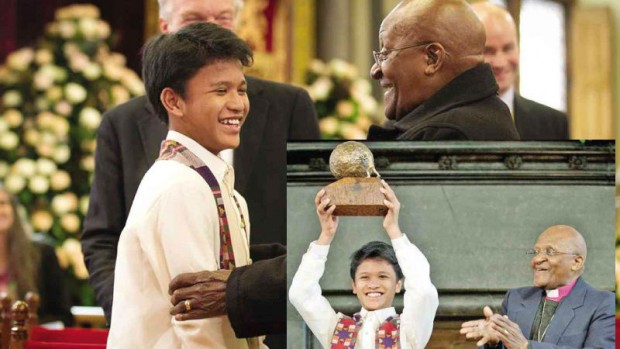
PEACE IS BLISS… (Clockwise from left) Kesz Valdez is congratulated by Nobel Peace laureate Bishop Desmond Tutu; with 2015 winner Abraham M. Keita of Liberia (to his left); (inset) raising his trophy while Tutu applauds PHOTOS FROM KESZ VALDEZ’S FACEBOOK PAGE AND KIDSRIGHTS WEBSITE
Championing Community Children (C3), the organization Valdez founded nearly a decade ago and which won for him the prestigious prize when he was only 13 years old, is looking for more helping hands.
Valdez, now 17, and other C3 members will be visiting starting next month various schools to “win over students” and “encourage them to become volunteers.” They will begin in his home turf, Cavite City.
Valdez told the Inquirer in a phone interview that they needed more volunteers because despite the recognition he received and the outpouring of support for his organization, more work was needed to be done on the ground.
“We can only say ‘mission accomplished’ if there are no more children left to fend for themselves on the streets,” he said.
Valdez’s concern for street children stems from his own experience. A scavenger at the age of 3, his own father considered him “bad luck to the family.”
At age 5, while rushing to be among the first to go through freshly unloaded garbage in a Cavite dump, Valdez was pushed onto a burning tire resulting in burns on his back and arm.
Abandoned by his family, Valdez was taken in by community worker Harnin “KB” Manalaysay of the outreach group Club 8586 and turned the former street kid’s life around.
Manalaysay also mentored Efren Peñaflorida, whose Kariton Klasrum made him the 2009 CNN Hero.
Valdez established C3 when he was only 8 years old. It distributes to less-privileged children “gifts of hope,” packages containing slippers, toys, candies, among other things. The organization also teaches children proper hygiene and their rights.
Since he won the International Children’s Peace Prize, the youngest and the only Filipino winner so far, Valdez said many positive changes had happened to him and his organization. For one, more people learned about his and his organization’s story.
In November, during the World Summit of Nobel Peace Laureates in Madrid, Spain, he was able to talk about his journey before world leaders and global change-makers.
He also visited a refugee camp in the Netherlands and told the kids there “not to lose hope.”
More partners
An important development for C3 was that there were now six organizations helping it, triple the number of partners it had before.
Valdez said C3 was receiving more donations unlike before when they had a problem putting together their gift packs.
He said the number of volunteers also grew quickly, from 40 to more than 200.
These meant, of course, more beneficiaries. When he received the prize in 2012, C3 had reached more than 10,000 children. Now, Valdez said, they have helped around 38,000 children in the cities of Cavite, Tacloban, Novaliches, Caloocan and even Zamboanga.
Beneficiary areas, Valdez said, are chosen after a team determines that the community really needs assistance. C3 usually stays in a community for about two months, conducting its program every weekend.
Despite the growth of his organization, Valdez said, he never felt that his work at C3 hampered his studies. “I’m happy with what I’m doing—being a volunteer. And my teachers are very supportive,” said Valdez, who is a Grade 10 student at Peñaflorida’s open high school.
Valdez, who initially said he wanted to be a doctor, is now considering social work as a career path and is thinking of going into the Humanities stream when he moves to senior high school, which will be fully implemented beginning school year 2016-2017.
Despite his success and the awards he has received, Valdez remains humble and unassuming. (Valdez was busy doing his own laundry when the Inquirer first called for this interview.)
AT A MEETING with the International Criminal Court to give input for developing policy on how to cope with child victims or child witnesses
Valdez credits Manalaysay, whom he considers his father, for keeping him grounded. “He always tells me to remain humble despite the praises and recognition,” he said.
In fact, he was upset that media reports focused on the prize money rather than the work C3 was doing that won him the award.
Valdez said continuing his advocacy through C3 and influencing others to do the same was important because “it’s one way to help our country reduce the number of children who become hopeless and feel that they have no purpose in life.”